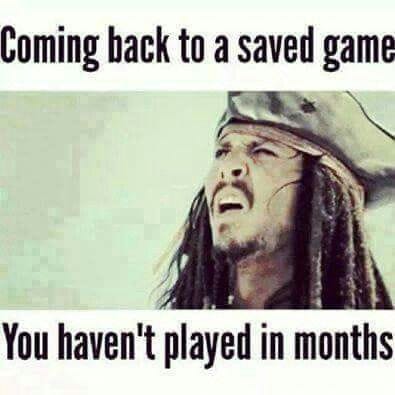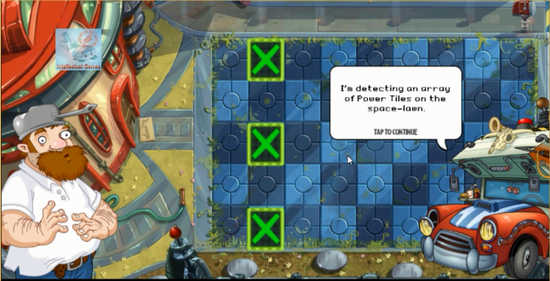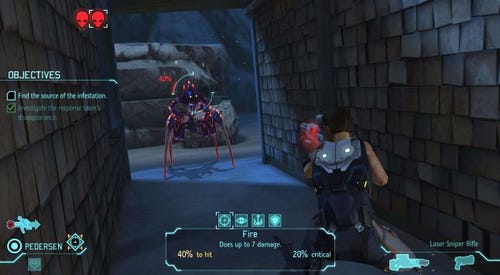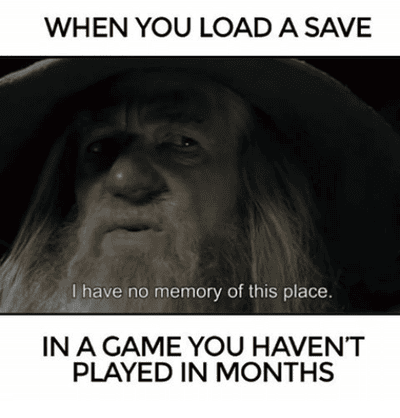Trending
Opinion: How will Project 2025 impact game developers?
The Heritage Foundation's manifesto for the possible next administration could do great harm to many, including large portions of the game development community.

Featured Blog | This community-written post highlights the best of what the game industry has to offer. Read more like it on the Game Developer Blogs or learn how to Submit Your Own Blog Post
Users can easily forget the game´s mechanics if they haven´t played for a while. That leads to frustration, which could make them abandon the game. In this article you´ll find potential solutions to mitigate such problem

Do you start and finish your games in one day? Unlikely. Like most of us, you need time. Days, sometimes weeks, months even. And commonly with hiatuses in between
After that time, what happens when you return to the game? You have probably forgotten critical info, which will prevent you from fully enjoying the game
Admittedly, it’s not the end of the world. After a couple of hours you’ve probably got back most of the knowledge you had at a point. Maybe faster if you google it, or it’s a simple game. However it’s highly probable you didn’t get back some key elements (controls, abilities, lore), which will affect your playing experience

Also, considering the habits of today’s players, you simply can’t afford your users to be confused for a couple of hours. Heck, not even 5 minutes. Ask any mobile dev: At the first sign of trouble you´ll lose an insanely high percentage of your users
At this point I hope I´ve convinced you of the possibility of returning players not remembering key information, and that this may be important depending on the project characteristics. Mitigation plans, then, are advisable
Now what type of information may users be missing after not playing for a while?
What were the controls?
Which are the game mechanics, and how do they function?
Which are the enemies’ characteristics?
Where am I in the storyline?
What is my progress on the game objectives?
Don’t assume players can google anything they may need. As an example, control layouts are rarely available online. Also, only reasonably popular games transpire into the net, and unfortunately your game may not be one of those. This issue may affect long games in particular (don´t be as arrogant as to presume users won´t stop playing your game because it´s THAT awesome) but also short ones: Remember most mobile designs encourage short playtime sessions
Here is where Catch-up systems (new term for your consideration) kick in. Let’s go through the most common implementations and potential improvements:
Back in the good old days, games came along with a manual. Not anymore. Control schemes are often taught in-game, which means you should replay those levels if you really want to fully recall them
The ¯\_(ツ)_/¯ solution for players forgetting them is… to do nothing: Users can normally play around with the controls without serious consequences (unless Permadeath is present) and hopefully bring back those memories. However complex button combinations may not be fully remembered, and it´s not uncommon the game will require you to use them at a point
Existing solutions: Some games include a help screen with the control layout, often in the Options menu. It is actually a great solution, just ensure your game has it
Other games have tutorial levels separated from the campaign. Stigmatized by many designers for breaking the learn as you play mantra, they´re actually a great help for returning players. Worth being considered as well
Best solution?: Coming back to the control layout screen, most users may not be aware of that screen. If the game is able to detect if the user hasn’t played for more than X days, consider adding a pop-up message to inform the player about that screen, and add a direct link to it

Detecting when players have been away is common on mobile devices. Why not on PC/Consoles?
When I returned to Plants vs Zombies 2 I found myself into a world with some flashy ground tiles I couldn’t remember the use of. I believe Crazy Dave briefed me about them at some point, but that info was lost, and unfortunately the Almanac (internal zombie wiki) only had info about my plants and the zombies but no other elements. In short, no idea what to do with them
 Power tiles they are, I found when writing this article
Power tiles they are, I found when writing this article
Existing solutions: Some games are comprehensive enough to include all game and level-specific systems in their in-game manuals. If your game is rich in mechanics you should really consider to add one of those
Best solution?: Any level with unique systems could have their own customized help screen as available as possible (even via direct links from the pause menu). Try to avoid a generic help menu with the most important options, and go deep into the specifics of each level
Most games require you to have a certain knowledge of the enemy behaviors in order to have a fair chance against them: i.e. “You can only open his guard if you make a perfect parry”. A knowledge you’ll likely lose if you haven’t played recently, which can easily lead to rage quits

Most games go for the ¯\_(ツ)_/¯ approach, which is to let the player fail/die some times and trust they´ll find their way and don´t quit. But again, we should try to find ways to mitigate that possibility
Existing solutions: Some games offer some sort of enemy wiki to refresh your memory. That’s actually a great start, although its existence may not be obvious for most users
Best solution?: If the game detects you haven´t played for a while AND you have failed to defeat a certain enemy for more than X minutes, it´d be perfect if you´re shown either the same tutorial message you were given when that foe was first introduced, or simply a pop-up reminder (i.e. “Kind reminder: Tank enemies can only be killed by exploding the canisters on their back!”)
A simpler approach could also be - again, if the game can detect if the user hasn’t played for more than X amount of time - adding a “Maybe you want to check the wiki?” pop-up message. If deemed too intrusive, it could be limited to those levels that contain the most complex enemies
The most classic issue, and the one that has received more attention from game developers so far: After a long period of inactivity, you’ve probably forgotten most characters, their motivations and all your story goals

Existing solutions: You can actually choose from different existing implementations. From purely text-based journals (common in RPGs), to menus offering to re-play unlocked cinematics ending with the more sophisticated solution of adding video recaps (Previously on Alan Wake) at the beginning of the game session
Best solution?: Solutions that do not force the player to leave gameplay (i.e. menus) to catchup with the story are undoubtedly the best. And as usual, any option that doesn´t detract the user from interactivity is preferable. Is it possible to include those reminders ingame? Example - What if the game is aware of the amount of time the player has been away, and the NPC dialogues are tailored to that circumstance? So, instead of having the generic “Hurry up, Nate” Sully will say “Have you forgotten we need to save your brother?”
When you left the game there was probably an active objective. For linear games this is not a problem (keep walking will take you to the next stage) but for games with multiple possible objectives confusion may be served
Even worst, some games offer high level challenges: Kill 1000 enemies, Increase your reputation with a certain faction, Complete all Miami missions and so on. If you haven’t played for a while, you probably have no idea those are still active
These challenges are often linked to achievements, but neither Playstation nor Xbox offer progress tracking on those, normally you´ll get a succinct Find all hidden treasures and you don’t know if you have only 1 or 30 of them
Since these challenges are generally optional or for completionists only it’s probably not at the top of your priorities, but you can save some frustration from your users if you offer some internal support for these
Existing solutions: Some sort of help menu showing your progress in a numeric form usually does the trick

Steam´s achievement progress
If you’re concerned about the break of immersion UI generally brings along, you can also mask that info through ingame NPCs that give you that data on a more story-friendly fashion
Best solution?: If the player hasn’t played in a while (but also if they did, actually) it’s probably a good polish idea to always show the current active objectives on the HUD right after loading the latest savegame - even if briefly
Analyze your project specifics and decide early on if your game experience is prone to people forgetting critical info. If that´s your case, consider the tools described above
If your project can afford the time, you should consider the most elaborate (and effective) ones. If not, there are some easy solutions that should mitigate potential issues and support your game as a long-term experience, as opposed to one of those people abandon at 20% progress.
Read more about:
Featured BlogsYou May Also Like